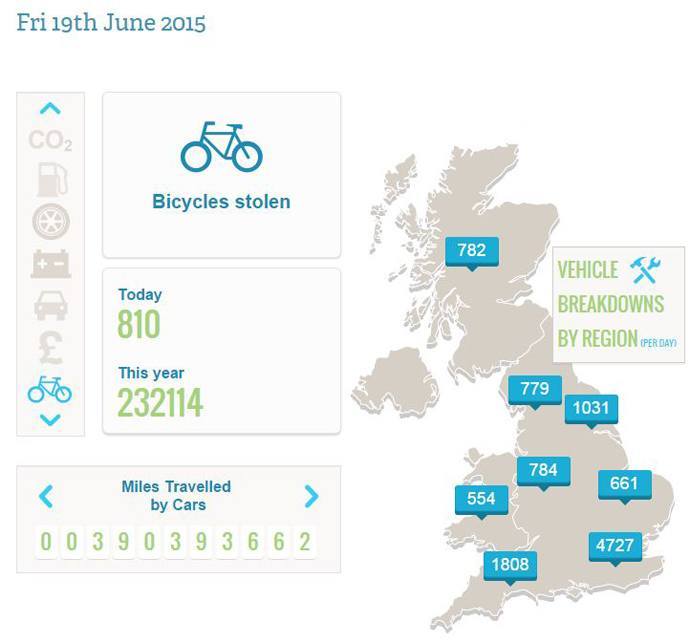Over 800 bicycles have been stolen today across Britain according to roadclock.com
How many bicycles stolen today?
The British crime survey, which examines people’s experience of crime rather than recorded offences, estimates that 533,000 are stolen bikes each year in Britain.
The Road Clock is a counter that displays many transport-related stats including total miles driven, petrol and diesel consumed, bicycles stolen and the number of car breakdowns each day.
Compiled and published by the ETA, the Road Clock counter reveals the astonishing amount of resources consumed, and pollution created, as a direct result of the way we travel each day.
Over one third of a million tons of CO² will be emitted lorries, coaches, cars and motorcycles. Over 85,000 tyres will be replaced. Over 100 million litres of fuel will be consumed. All on Britain’s roads. Today.
The clock pulls data from a variety of sources and publishes statistics on the consumption of petrol and diesel and the resulting CO² emissions. These and many more interesting transport facts can be found at the world’s first road use counter, the Road Clock.
As well as the environmental impact of driving, the stats for cycle theft are astonishing. Over 1,000 bicycles will today be stolen.
Amaze your friends with facts from Road Clock.
How many cars, vans and motorcycles break down each day?
Based on the driving history of 800,000 current customers, car breakdown provider ETA calculated the areas in Britain where the most breakdowns occur. Get an instant quote for car, motorcycle or van breakdown cover.
How much car crime?
According to official police-recorded figures for car crime – which include stolen vehicles as well as thefts from cars and vans – stood at 456,000 in 2010.
How much CO² from road transport?
The government issues a fact sheet looking at British greenhouse gas (GHG) from road transport. Road transport accounts for the majority of GHG emissions from transport and around a fifth of all British greenhouse gas emissions. Road transport greenhouse gas (GHG) emissions increased to 113.6 MtCO2e in 2009, which equates to 334,794,000kg per day.
How many car tyres are replaced each day?
According to the tyre industry federation, 32 million tyres are replaced each year in Britain. This figure does not include remoulds. Vehicle tyres replaced each day: 87,671.
How many miles driven in Britain?
Department for transport traffic statistics provide estimates of the vehicle miles travelled each year in Great Britain, by vehicle type, road category and region. Cars: 659,452,054.
How much petrol and diesel used every day?
According to an article on energy trends published by the Department for Energy and Climate Change, 35.4m tons of fuel is consumed each year by vehicles on British roads. 1 metric ton = 1000 kg. 1000 kg / 0.850 kg/L = 1176.47 litres. Petrol & diesel consumed per day: 114,090,364 litres.
Cycle insurance – the devil is in the detail
On the face of it, one cycle insurance policy is much like another, but the devil is the detail. How much excess you will be charged is just one of the things that varies wildly between providers. Another is so called ‘new-for-old’ replacement – many insurers use this term, but if your bicycle is more than a few years old, devalue it severely. This means you are left out of pocket when you come to replace it.
ETA cycle insurance has a low standard excess of 5% (minimum £25) and offers a new-for-old for life – how ever old the bike, if it’s stolen you get enough to buy a new model.
 For 25 years we have been providing straightforward, affordable bicycle insurance. Whether you use your bike to commute, shop, race or amble in the park, ETA Cycle Insurance has you covered. We never devalues bikes no matter their age, allow you to buy your replacement bike wherever you like, replace stolen quick release components and we handle claims in-house. Can your insurance provider say the same?
For 25 years we have been providing straightforward, affordable bicycle insurance. Whether you use your bike to commute, shop, race or amble in the park, ETA Cycle Insurance has you covered. We never devalues bikes no matter their age, allow you to buy your replacement bike wherever you like, replace stolen quick release components and we handle claims in-house. Can your insurance provider say the same?
Furthermore, every cycle insurance policy you buy helps support the work of the ETA Trust, our charity campaigning for a cleaner, safer transport future.

0 Comments View now